What's Happening?
Rivian, an electric vehicle manufacturer, is laying off less than 1.5% of its workforce, which equates to approximately 225 employees, primarily from its commercial team. This move is part of a cost-cutting strategy as the company prepares to launch its new R2 SUV, priced at $45,000, aimed at a broader market compared to its higher-priced models. Despite reporting a $1.1 billion loss in the second quarter, Rivian claims to have sufficient funds to bring the R2 to market. The layoffs come as the company faces financial pressures from expiring U.S. EV tax credits and regulatory changes, which have affected revenue streams.
Why It's Important?
The layoffs and financial challenges highlight the broader difficulties faced by the electric vehicle industry, particularly as companies like Rivian navigate regulatory changes and market dynamics. The expiration of the $7,500 federal EV tax credit and changes in fuel economy regulations have disrupted revenue for EV manufacturers. Rivian's strategy to introduce a more affordable SUV could help it capture a larger market share, but the company must manage its operational efficiency and liquidity carefully. The situation underscores the competitive and regulatory pressures in the EV market, affecting not only Rivian but also other automakers like GM and Volkswagen.
What's Next?
Rivian's focus will be on the successful launch of the R2 SUV, which is crucial for its long-term growth and market positioning. The company will need to navigate the challenges posed by the expiration of EV tax credits and potential regulatory changes. Additionally, Rivian may need to explore further cost-cutting measures or strategic partnerships to enhance its financial stability. The broader industry will be watching how Rivian and other automakers adapt to these challenges, which could influence future policy decisions and market strategies.











